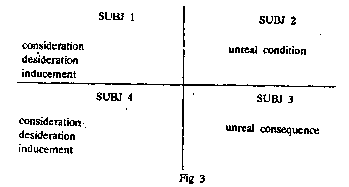
95
The described system is not finished in
terms of the historical development of language; on the contrary,
it is in the state of making and change. Its actual manifestations are complicated by neutralizations of formal
contrasts (such as, for instance, between the past indicative and the past subjunctive in reported speech); by
neutralizations of semantic contrasts (such as, for instance, between the con-siderative modal spective and the
desiderative modal spective); by fluctuating uses of the auxiliaries (would - should); by fluctuating uses of the
finite be in the singular (were - was); etc. Our task in the objective study of language, as well as in language
teaching, is to accurately register these phenomena, to explain their mechanism and systemic implications, to
show the relevant tendencies of usage in terms of varying syntactic environments, topical contexts, stylistic
preferences.
As we see, the category of mood, for all the positive linguistic work performed upon it, continues to be a
tremendously interesting field of analytical observation. There is no doubt that its numerous particular
properties, as well as its fundamental qualities as a whole, will be further exposed, clarified, and
paradigmatically ordered in the course of continued linguistic research.
C H A P T E R XVIII
ADJECTIVE
§ 1. The adjective expresses the categorial semantics of property of a substance. It means that each adjective
used in the text presupposes relation to some noun the property of whose referent it denotes, such as its
material, colour, dimensions, position, state, and other characteristics both permanent and temporary. It follows
from this that, unlike nouns, adjectives do not possess a full nominative value. Indeed, words like long,
hospitable, fragrant cannot effect any self-dependent nominations; as units of informative sequences they exist
only in collocations showing what is long, who is hospitable, what is fragrant.
The semantically bound character of the adjective is emphasized in English by the use of the prop-substitute
one in the absence of the notional head-noun of the phrase. E.g.:
I don't want a yellow balloon, let me have the green one over there.
On the other hand, if the adjective is placed in a nominatively self-dependent position, this leads to its
substantivization. E.g.:
Outside it was a beautiful day, and the sun tinged the snow with red.
Cf.: The sun tinged the snow with the red colour.
Adjectives are distinguished by a specific combinability with nouns, which they modify, if not
accompanied by adjuncts, usually in pre-position, and occasionally in post-position; by a combinability with
link-verbs, both functional and notional; by a combinability with modifying adverbs.
In the sentence the adjective performs the functions of an attribute and a predicative. Of the two, the more
specific function of the adjective is that of an attribute, since the function of a predicative can be performed by
the noun as well. There is, though, a profound difference between the predicative uses of the adjective and the
noun which is determined by their native categorial features. Namely, the predicative adjective expresses some
attributive property of its noun-referent, whereas the predicative noun expresses various substantival
characteristics of its referent, such as its identification or classification of different types. This can be shown
on examples analysed by definitional and transformational procedures. Cf:.
You talk to people as if they were a group.
>You
talk to people as if they formed a group. Quite obviously,
he was a frtend.
>His
behaviour was like that of a friend.
Cf., as against the above:

